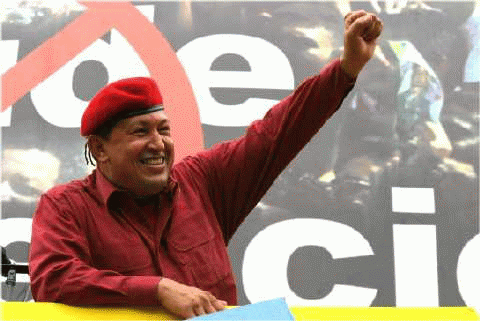VHeadline commentarist Arthur Shaw writes: On March 15, 2009, Venezuelan President Hugo Chavez announced on his popular weekly TV show that the administration of Venezuela's ports and airports will be transferred from the state governments to the National Government in order to defend national sovereignty and combat corruption, contraband, and drug trafficking.
As far as drug trafficking is concerned, it is significant that US imperialists now accuse Venezuela of not only failing to fight drug traffickers, but also of aiding drug traffickers. This a grave accusation from the imperialists against the glorious Venezuelan Revolution. The US imperialists relentlessly allege that Venezuela's ports and airports are major transshipment centers for most of the cocaine that enters the USA.
Most of the bourgeois leaders, including their entire families, of the opposition in Venezuela are involved in drug trafficking and human smuggling (prostitutes, slaves, child slaves, illegal immigrants, etc) to the US market, the biggest market for illegal drugs in the world and one of the largest markets for smuggled people.
Five of the twenty-three Venezuelan states (about 20% of the states) are governed by the opposition and bourgeois leaders of these five governmental entities opposed Hugo Chavez' "nationalization" or "centralization" of the ports and airports. Eighteen of the twenty-three states (about 80% of the states) are governed by revolutionaries or by their allies and these 18 entities support the Chavez' takeover of ports and airports.
As soon as the reactionaries heard Chavez' announcement Sunday, March 15, the corrupt bourgeois leaders of the opposition in Venezuela jumped up and screamed "Hugo, you can't take over ports and airports because Article 164 of the Constitution vests exclusive competence over ports and airports in state governments, not in the National Government." The reactionary bourgeois leaders also screamed that a recent law passed by the National Assembly granting Hugo Chavez the authority and "competence" to take over the ports and airports is unconstitutional because the law conflicts with Article 164 of the Constitution.
This Article 164 says the states have "EXCLUSIVE" competence for the "conservation, management and exploitation of ... ports and airports in commercial use." But the states must exercise their exclusive competence "in coordination with the National Executive" or, in other words, in coordination with Hugo Chavez. The term "competence" in Article 164 is used narrowly and technically to refer more to the possession of legal authority over something rather than to the skill or know-how required to do something.
So, the starting point of the opposition is Article 164 which says state governments run ports and airports.
The opposition and the US imperialists may not be right in this dispute over the ports and airports, but at least for once they have, in Article 164, one leg to stand on. So far, nobody denies that the ports and airports are in commercial use. The opposition argues however that the takeover of the ports and airports by the National Government is more than "coordination" that Article 164 mentions and contemplates. So, in our discussion, we don't have to be too concerned with the side issues about "commercial use" and "coordination."
At point blank range, our question is: Can Hugo Chavez legally takeover ports and airports?
Article 164 is not the only article in the Constitution that deals with ports and airports. For example, Article 156 of the Constitution, in part, says: "The national transportation and shipping system and air, overland, ocean, river and lake transportation of a national nature; ports, airports and their infrastructure" are in the "competence" of the national public power to which the president of the Venezuela belongs. Article 156 expressly mentions ports and airports as being under the competence of the National Government. But even if Article 156 had failed to mention port and airports, almost nobody ... but a lunatic member of the bourgeois opposition ... would argue that the reference to the "national transportation and shipping system and air, overland, ocean, river and lake transportation of a national nature" excludes ports and airports.
How can ports and airports, under 164, be under the "EXCLUSIVE" competence of state governments when 156 shamelessly and flagrantly puts the same ports and the same airports under the competence of the National Government?
What kind of "exclusivity" is this?
This bizarre kind of "exclusivity" that spreads itself out over multiple entities perplexes us.
So, what we have here is, on the one hand, Article 164 saying the states got the ports and airports but the state governments must coordinate with the National Government. And, on the other hand, we have Article 156 saying the National Government ... too ... got the ports and airports with no mention, in Article 156, of a duty on the part of the National Government to coordinate with state governments.The difficulty is that "the Constitution is the supreme law " according to its Article 7. But both articles, 164 and 156, are parts of the Constitution. So, both articles partake of the supreme. Is 164 more supreme than 156 or vice versa? What we really need, here, is a piece of law that flat-out says, in cases of a conflict, a provision of the constitution that applies to the National Government supersedes a similar constitutional provision that applies to state governments. But, so far, we haven't found a piece of law of this nature.
Perhaps, Article 136 throws some light on this perplexing dispute between the national and some of state governments over the ports and airports. Article 136, in part, says "Each of the branches of Public Power [that is, the whole Venezuelan state] has its own functions, but the organs charged with exercising the same shall cooperate with one another to attain the ends of the State."
(Note: You can view every article as one long page if you sign up as an Advocate Member, or higher).




